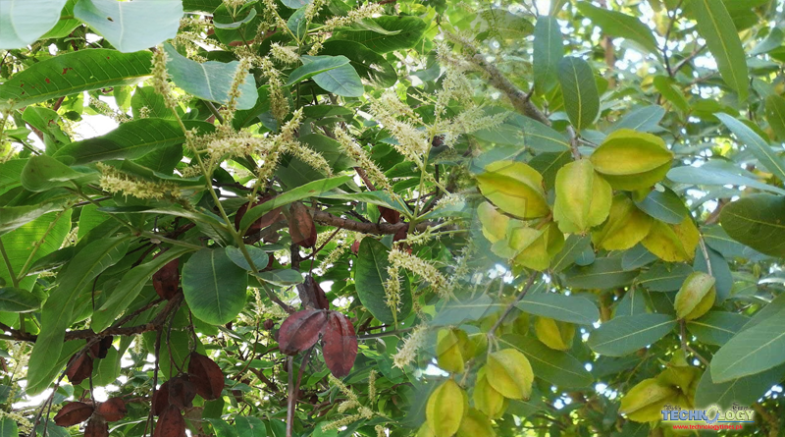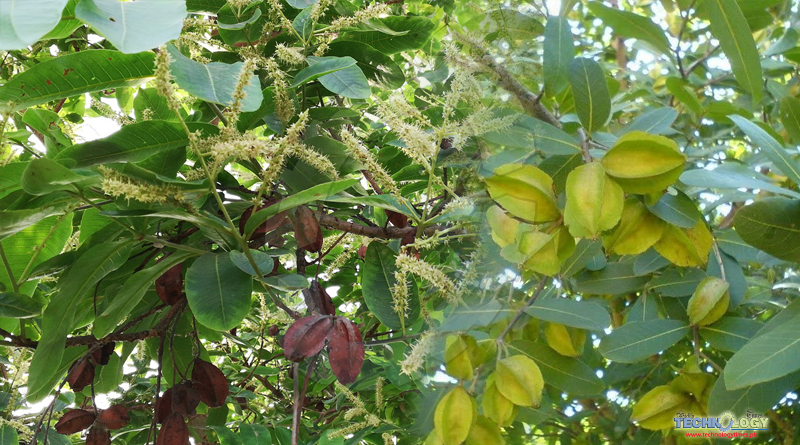Arjun (Terminalia arjuna) is a medicinal plant with a long history of use in ayurvedic medicine for its potential health benefits.

Arjun (Terminalia arjuna) is a tree native to India that has been used in traditional Ayurvedic medicine for centuries. It belongs to the Combretaceae family and can grow up to 20–25 metres in height.
The tree has a thick, grey bark that peels off in irregular flakes and produces white, yellow, or pink flowers that bloom between March and June.
The tree produces flowers that are yellow and purple and contains a hard, woody shell with 1–5 seeds inside. The bark of the Arjun tree is the part of a plant that is most commonly used for its medicinal properties, and it’s also known for its ability to promote heart health, lower blood pressure, and improve cholesterol levels.
- Historical use in ayurvedic medicine Arjun has been used in Ayurvedic medicine for thousands of years. In Ayurveda, Arjun is considered a valuable herb for promoting cardiovascular health and treating a wide range of ailments. It is believed to have anti-inflammatory, ischemic, antioxidant, and analgesic properties. It is also used to manage respiratory conditions, such as asthma and bronchitis, and to treat digestive problems, including diarrhea and dysentery. Along with its medicinal uses, it is also used in Ayurveda for its spiritual and cultural significance. It is also considered sacred and is therefore used in religious ceremonies and festivals. It is also believed that Arjun has calming properties and is therefore used in meditation practices .
This article aims to unlock the therapeutic potential of Arjun and its uses in the treatment of various heart diseases, lowering blood pressure, lowering cholesterol levels, and many more.
- Chemical composition of Arjun contains several bioactive compounds that contribute to its therapeutic properties. These compounds include :
Flavonoids Arjun bark is rich in flavonoids such as quercetin, kaempferol, and myricetin. And are known for their antioxidant and anti-inflammatory properties, which play a role in protecting the heart and reducing the risk of chronic diseases.
Tannins are polyphenolic compounds that have astringent properties. Triterpenoids such as arjunic acid, arjunolic acid, and oleanolic acid are also known for their antioxidant and anti-inflammatory properties. Saponins such as glycosides and phytosterols. The combination of these bioactive compounds contributes to its therapeutic properties.
- Health benefits of Arjun Terminalia arjuna has a range of potential health benefits including cardiovascular health.
Modern research supports its use for managing a range of cardiovascular conditions, including hypertension, angina, and congestive heart failure. It helps lower blood pressure, reduce cholesterol levels, and improve heart functions.
Arjun has been found to have anti-inflammatory properties, which may help reduce inflammation in the body and alleviate pain and swelling associated with various health conditions. Arjun also has hepatoprotective effects and protects the liver from damage caused by toxins and free radicals.
Arjun has also been traditionally used to manage respiratory conditions such as asthma and bronchitis. Arjun also contains compounds such as flavonoids and tannins that have been shown to have anti-cancer properties. Arjun plants also have anti-diabetic and antimicrobial effects.
- Precautions and potential side effects: Terminalia arjuna is considered safe when used in recommended doses but there are some potential side effects as well:
Gastrointestinal discomfort is experienced, such as nausea, vomiting, and diarrhea, when using Arjun.
Hypoglycemia Arjun lowers blood sugar levels, and people with diabetes or hypoglycemia should monitor their blood sugar levels carefully while using Arjun.
Hypotension: Those who use medications for lowering blood pressure should use Arjun with caution. Arjun should be used with caution during pregnancy and breastfeeding.
Arjun may interact with certain medications, such as anti-hypertensive, anti-diabetic, and antiplatelet medications. Some people may be allergic to Arjun; it is therefore important to discontinue use and seek medical attention immediately if any signs of an allergic reaction occur.
Arjun (Terminalia arjuna) is a medicinal plant with a long history of use in ayurvedic medicine for its potential health benefits. Modern research has supported its use for managing cardiovascular conditions, reducing inflammation, improving liver function, managing respiratory disorders, and potentially preventing and treating cancer .
Arjun may also have anti-diabetic and anti-microbial effects. However, it is important to use Arjun with caution and under the guidance of a healthcare practitioner, as it may have potential side effects and interactions with medicines.
More research is therefore needed to understand the therapeutic potential and safety of Arjun, but it may be a useful adjunct to conventional treatments in managing certain health conditions.
